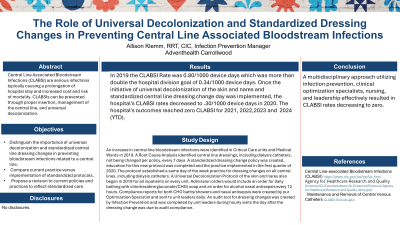Quality Assurance and Performance Improvement
Category: Quality Assurance and Performance Improvement
ePoster Kiosk Presentation
QAPI 158 - The Role of Universal Decolonization and Standardized Dressing Changes in Preventing Central Line Associated Bloodstream Infections
Tuesday, June 4, 2024
12:16 PM - 12:45 PM CST
Location: Kiosk 2 - APIC Central, Hall 1

Has Audio
.jpg)
Allison Klemm, CIC
Infection Prevention Manager
Adventhealth Carrollwood
Presenter(s)
Disclosure(s):
Allison Klemm, CIC: No financial relationships to disclose
Background: Central Line Associated Bloodstream Infections (CLABSI) are serious infections typically causing a prolongation of hospital stay and increased cost and risk of mortality. CLABSIs can be prevented through proper insertion, management of the central line, and universal decolonization.
Methods: An increase in central line bloodstream infections were identified in Critical Care units and Medical Wards in 2019. A Root Cause Analysis identified central line dressings, including dialysis catheters, not being changed per policy, every 7 days. A standardized dressing change policy was created, education for this new protocol was completed and the practice implemented in the first quarter of 2020. The protocol established a same day of the week practice for dressing changes on all central lines, including dialysis catheters. A Universal Decolonization Protocol of the skin and nares also began in 2019 for all inpatients on every unit. Admission orders would include an order for daily bathing with chlorhexidine gluconate (CHG) soap and an order for alcohol nasal antisepsis every 12 hours. Compliance reports for both CHG baths/showers and nasal antisepsis were created by our Optimization Specialist and sent to unit leaders daily. An audit tool for dressing changes was created by Infection Prevention and was completed by unit leaders during hourly visits the day after the dressing change was due to audit compliance.
Results: In 2019 the CLABSI Rate was 0.80/1000 device days which was more than double the hospital division goal of 0.34/1000 device days. Once the initiative of universal decolonization of the skin and nares and standardized central line dressing change day was implemented, the hospital's CLABSI rates decreased to .30/1000 device days in 2020. The hospital's outcomes reached zero CLABSI for 2021, 2022, and 2023 (YTD).
Conclusions: A multidisciplinary approach utilizing infection prevention, clinical optimization specialists, nursing, and leadership effectively resulted in CLABSI rates decreasing to zero.
Learning Objectives:
- Distinguish the importance of universal decolonization and standardized central line dressing changes in preventing bloodstream infections related to a central line.
- Compare current practice versus implementation of standardized protocols.
- Propose a revision to current policies and practices to reflect standardized care.

